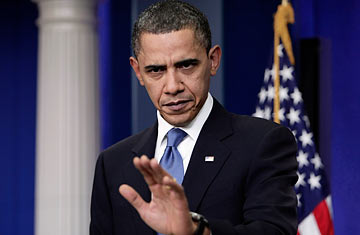
President Obama gestures during the daily press briefing in the White House
"I want a substantive discussion," President Obama said Tuesday, just moments before his press secretary, Robert Gibbs, stood before reporters with the words eggs, milk and bread written on his palm — a mocking jab at potential Republican 2012 contender, Sarah Palin, who was caught cribbing speech notes from her hand over the weekend.
The two messages were not as contradictory as they seemed. Both telegraphed the tight political spot in which the President now finds himself, as well as a determination by Obama and his aides to regain the upper hand in time for the upcoming elections. It's a delicate strategy that calls for Obama to reposition himself as a bipartisan outsider fighting to change Washington even as his aides increasingly play the sharply partisan inside game. "At this critical time in our country, the people who sent us here expect a seriousness of purpose that transcends petty politics," Obama said, either unaware or unconcerned about the joke Gibbs was readying.
The calculation runs straight through public opinion polls. A survey completed Monday by the Washington Post and ABC News found than nearly 6 in 10 Americans — including 56% of independents — believe the Republicans are not doing enough to forge a compromise on important issues. By contrast, just 45% of Americans think Obama is doing too little. In that spread, lies a distinct, potential political advantage for the President.
Republicans, meanwhile, are also caught in a seemingly contradictory mode. On the one hand, they must broadcast their willingness to do everything they can to work with Obama. On the other hand, Republicans do not want to grant Democrats any major legislative victories before the November elections. "We had a good meeting with the President, and, what I'd like to emphasize is there are some areas of potential agreement," Senate minority leader Mitch McConnell said in an e-mailed statement, after meeting with President Tuesday. Outside the White House, however, McConnell offered a different message in person. "What we need to do is start over," he said about health care reform. "Why would they want to keep pushing something that the public is overwhelmingly against?"
All over Washington, as another snowstorm approached, this sort of swirling message confusion reigns, as Democrats and Republicans both maneuver for political advantage while claiming to be above politics. The well-staged jockeying to rise above America's most cynical caricatures of Washington politics risks only confirming the worst in the minds of voters.
In an Op-Ed published Tuesday in USA Today, John Brennan, the top White House counterterrorism aide, chastised members of Congress for "misrepresenting the facts to score political points" in their criticism of the handling of Umar Farouk Abdulmutallab, the Christmas Day bomber. Then he added what looked like a political attack of his own. "Politically motivated criticism and unfounded fear-mongering only serve the goals of al-Qaeda," Brennan wrote. Predictably, this caused another round of criticism, with Missouri Senator Kit Bond, the ranking Republican on the Intelligence Committee, responding by announcing that Brennan is part of a "political mess at the White House" that "puts our country at risk."
Beneath all of the posturing is a hard reality for Democrats: with historic majorities in both houses of Congress, the President's own party shoulders the primary burden for passing legislation. Disagreements between Democrats have so far been major stumbling blocks to passing health care reform, as have apparent disagreements between House and Senate Democrats over the shape of financial regulatory reform. "The big question on health care is whether it is better to ask the Democrats who voted for this once to go home and defend that vote without a piece of legislation or ask them to vote for it again," said one Administration official.
But as those discussions continue, Democratic leaders have been trying to focus the public attention on Republicans, with Obama announcing a bipartisan meeting on Feb. 25 to discuss a way forward on health care. Officially, Republicans are welcoming the opportunity, even as they stake out positions that effectively foreclose the possibility of meaningful compromise. "Really, right now, it's up to the President and Speaker Pelosi to start listening to the American people," the No. 2 House Republican, Eric Cantor, told Fox News Tuesday, when asked about the meeting. "If they don't, there's not much to talk about."
It was an ultimatum of sorts. And in today's Washington, it is what passes for an invitation to bipartisan compromise.
— With reporting by Michael Duffy / Washington
